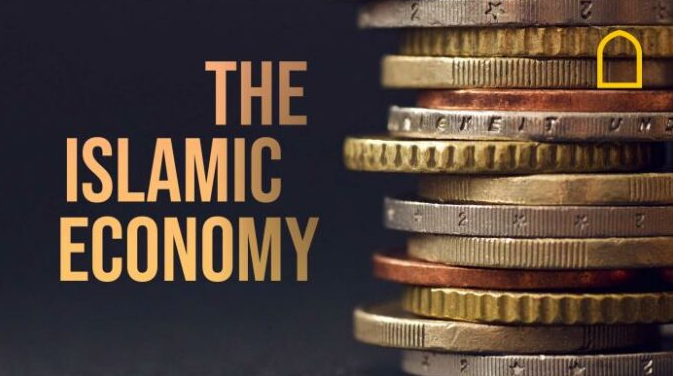Men are by nature social they cannot live without cooperation. Hence they must serve one another and take from one another and give to one another, so they demand suitable compensation. Economics is a matter of guaranteeing the rotation of assets among humans. The main objective of Islamic Economics is to establish social justice, elimination of poverty, tangible reduction in economic disparities and free society of corruption. It is a well-recognized phenomenon that an Islamic economic system is completely different from socialism and capitalism because of its distinct features. The Islamic economic system is the collection of rules, values and standards of conduct that organize economic life and establish relations of production in an Islamic society.
These rules and standards are based on the Islamic order as recognized in the Quran and Sunnah, evolving life of Muslims all over the globe. Since the time of the Prophet Muhammad (SAW), the concept of Islamic economics had been practiced. The way the Prophet practiced the principles of Islamic law in his economic activities should be a guideline for every Muslim. The Prophet (SAW) put forward the values of honesty, justice, ethics, and morals, as long as they are in the corridors of Islamic law, prohibiting usury transactions, and so on. The profit-sharing system that has been widely talked about has long also been practiced. Islamic economic conversations that are re-emerging should not only be considered as alternatives to the current conventional system. Islamic economy is a necessity whose values can be applied to everyone, not only for Muslims.
The economic policy of Islam has also been explained in the Quran, in most unequivocal terms: “… so that this (wealth) may not circulate solely among the rich from among you… ” (Q. 59/7). Equality of all men in wealth and comfort, even if it is ideal, does not promise to be of unmixed good to humanity. First because natural talents are not equal among different men, so much so that even if one were to start a group of persons with complete equality, soon the spendthrift will fall into difficulties and will again look on the fortune of his comrades with greed and envy. Further, on philosophical and psychological grounds, it seems that in the very interest of human society it is desirable that there should be grades in wealth, the poorer having the desire and incentive to work harder. On the other hand, if everybody is told that even if he works more than what is required of him as his duty, he would get no reward and would remain as those who do not do more than their duty, one would become lazy and neglectful, and one’s talent would be wasted to the great misfortune of humanity.
Islamic economics is the knowledge and application of injunctions and rules of the Shariah (Islamic law) that prevent injustice in the acquisition and disposal of material resources in order to provide satisfaction to human beings and enable them to perform their obligations to Allah (SWT) and the society. Allah says in Quran, Al Hasyr [59:7] ; “And what Allah restored to His Messenger from the people of the towns – it is for Allah and the Messenger and for [his] near relatives and orphans and the [stranded] traveler – so that it will not be a perpetual distribution among the rich from among you. Moreover, whatever the Messenger has given you – take; and what he has forbidden you – refrain from. And fear Allah; indeed, Allah is severe in penalty.”
Everybody in this world is given the freedom to move to achieve their respective goals. The principle is not to violate the rules of the Islamic law that have been set out in the Qur’an and Hadith. Allah has said in Surah Al Baqarah [2:188] ; “And do not consume one another’s wealth unjustly or send it to the rulers in order that you consume a portion of the wealth of the people in sin, while you know”. Islam has halal-haram restrictions, consequently impacting human life both in the world and in the hereafter. Thus, our activities as Muslims must not violate the halal and haram restrictions. Luxury and excessive things are prohibited in Islam. In addition, feeling above the law is also prohibited. There are many examples of how modern law can be traded by wealth. Allah SWT said in Surah Al A’raf [7:31] ; “O children of Adam, take your adornment at every masjid, and eat and drink, but be not excessive. Indeed, He likes not those who commit excess.”
Zakat is one of the economic characteristics of Islam that does not exist in other economic systems. The wealth that we have is essentially God’s property, so we need to spend this treasure to provide for the Islamic cause. The purpose of zakat is to cleanse the soul of envy, misery, and revenge. From every property that we have, not only must we pay taxes, but we are obligated to pay zakat if it reaches its limit (nishab), this zakat is called zakat mal (wealth). However, the zakat fitrah must be paid by every Muslim during the month of Ramadan. Islamic economic system provides a broad spectrum of business ethics that traders must practice. It is indispensable for a trader to deal admirably with these ethics in business transactions of daily life.
Islamic Economics represents a systematic effort to try to understand the economic problem and man’s behaviour in relation to that problem from an Islamic perspective. It is the knowledge and application of injunctions and rules of the Shariah that prevent injustice in the acquisition and disposal of material resources in order to provide satisfaction to human beings and enable them to perform their obligations to Allah (SWT) and society. Islamic economics is the study of Muslim’s behavior who organizes the resources, which are a trust, to achieve “falah”. It is an approach to interpreting and solving man’s economic problems based on the values, norms, laws and institutions found in, and derived from all sources of knowledge (Shariah). The Qur’an has explicitly ordained Muslims to help one another in furthering God-consciousness (taqwa) and virtue (birr). Thus mutual help rather than conflict should be the basis of all economic relationship.
The main objective of Islamic Economics is to establish social justice, elimination of poverty, tangible reduction in economic disparities, free society of corruption society through the institution of Zakah, interest free system, moral and ethical instruments of Islamic teachings and the ultimate goal is to seek the pleasure of Allah (swt); The Islamic economic system does not support the debt-based economy – an unjust, exploitative and inequitable economy. It clearly spells out economic rights and concepts of property, contracts, work and the distribution of income and wealth. It stipulates a framework of values and disvalues, desirables and undesirables and hedges the market mechanism with a set of moral filters so as to ensure efficiency and equity in the processes of the allocation of resources.
Islamic economics is different from the conventional/mainstream economics because Islamic economics is based on two distinct variables, which are not the part of conventional one, i.e., faith and the consciousness of the hereafter.
(M Ahmad is a regular writer for this newspaper and can be reached at [email protected])








